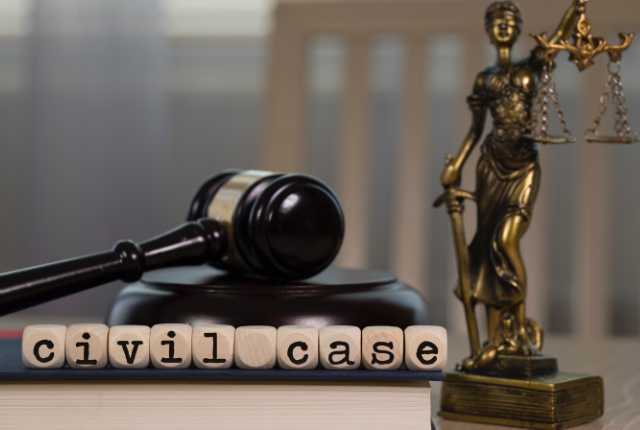The 7 Steps in a Civil Case: Your Complete Guide

Have you found yourself in a civil dispute? Whether you’re dealing with a breach of contract, personal injury, or any other civil case, the experience can be intimidating.
But don’t worry, we’re here to help. Our complete guide to the seven steps in a civil case is the ultimate resource for easily navigating the process.
Our civil litigation attorney will walk you through every stage, from filing a complaint to the final judgment. With our guidance, you’ll have the knowledge and confidence to take on your case and come out on top.
-
Filing the Complaint
The first step in civil litigation is drafting and filing your complaint. Each jurisdiction may have specific rules and regulations that need to be followed, so it’s essential to familiarize yourself with them. This will ensure that your complaint meets all the necessary criteria and is not dismissed on technicalities.
Determine which court can hear your case based on factors such as where the incident occurred or where the defendant resides. Filing in the wrong jurisdiction can lead to delays or even dismissal of your case, so thorough research is vital.
-
Pretrial Procedures
Pretrial procedures are the preliminary steps before a trial begins, including evidence gathering, discovery, and negotiation attempts. These processes lay the groundwork for an organized and informed legal battle.
Discovery
Discovery is a phase in a civil case where both parties exchange information and evidence relevant to the lawsuit.
One important aspect is document production, where each side must provide the other with copies of relevant documents or items that may be used as evidence in court. In addition to document production, another key component of discovery is interrogatories.
These are written questions that one party sends to the other, seeking answers under oath. Interrogatories allow you to gather specific information from your opponent about their version of events, their witnesses, and any documents they plan to use at trial.
Depositions
A deposition is a legal process where a witness, often a party involved in a lawsuit, provides sworn, out-of-court testimony. Attorneys from both sides ask witnesses questions to gather information and understand their knowledge of the case.
The deposition is typically recorded, and the transcript can be used as evidence during the trial or settlement negotiations.
Motions
A motion is a formal request made by one party to the judge, asking for a specific action or decision to be taken. These requests are typically supported by legal arguments and evidence. Motions can serve several purposes throughout a civil case. They can be used to dismiss the case entirely if there’s insufficient evidence or lack of jurisdiction.
They can also be filed to ask for summary judgment, which means requesting the judge to decide on certain issues without going through a full trial. Additionally, motions may seek to exclude or limit certain evidence from being presented during trial.
-
Settlement Negotiations
Settlement agreements are legally binding contracts that outline the terms and conditions agreed upon by both parties involved in a civil case. These agreements can cover various aspects, including financial compensation, future obligations, confidentiality provisions, and other relevant terms specific to the case.
When engaging in settlement negotiations, it’s essential to carefully review and consider all proposed terms before reaching an agreement. This ensures that your rights and interests are protected while promoting a fair resolution for both parties involved.
-
Trial Preparation
Preparing for trial involves carefully considering and strategizing evidence and arguments to effectively advocate for your position in court. A strong trial strategy is crucial as it sets the foundation for a successful outcome.
This includes analyzing the strengths and weaknesses of your case, identifying key legal issues, and determining the most persuasive way to present your evidence.
Collect all evidence that supports your claims or defenses. This might mean looking at documents, talking to witnesses, or analyzing data with an expert.
Next, organize this evidence in a way that makes sense. You can present it in chronological order or by how relevant it is. This will help the judge or jury understand your case better.Along with presenting evidence, it’s also crucial to develop strong arguments. You should be ready to respond to the other side’s arguments.
-
Trial
Both parties present their arguments and evidence before a judge or jury during a civil trial. The plaintiff, who initiated the lawsuit, presents their case first, outlining their claims and presenting witnesses and documents to support their position.
The defendant then has the opportunity to counter these claims, presenting their own evidence and witnesses. Each side cross-examines the opposing witnesses and presents their legal arguments.
The judge or jury assesses the evidence, weighs the arguments, and ultimately reaches a verdict. The trial process aims to achieve a fair and impartial dispute resolution based on the presented facts and applicable laws.
-
Closing Arguments
In the final moments of a civil trial, you’ll witness the attorneys making their closing arguments. This is when they passionately advocate for their clients and aim to leave a lasting impression on the jury.
In these arguments, both sides can summarize their case, highlight key evidence, and address weaknesses in their opponent’s arguments. The goal is to persuade the jury to see things from their client’s perspective.
Attorneys also have a chance to deliver rebuttal arguments where they directly respond to opposing counsel’s points during their closing argument.
-
Verdict and Post-Trial Procedures
Once the jury has decided, the judge will announce the verdict in court. This verdict is very important as it decides the case’s outcome and can affect both parties. If you win, your arguments were successful, and you may be entitled to damages or relief.
If you lose, you may have to accept responsibility for any damages awarded against you. After the verdict, both parties have options, such as filing an appeal. However, it’s important to note that an appeal doesn’t automatically mean a new trial. You must speak with your attorney, who can help guide you through the post-trial procedures.
Contact Titus Law Firm Today
Are you facing a civil case and need legal guidance? Our civil litigation attorneys at the Titus Law Firm are here to assist you. Whether you’re a plaintiff seeking justice or a defendant defending your rights, our attorneys have the experience to navigate the complexities of the legal system. We understand each step in a civil case and can provide tailored advice to protect your interests.
Don’t face the challenges of a civil case alone. Contact us today to schedule a consultation and explore your options. With our dedicated support, you can make informed decisions and pursue the best possible outcome for your case.

